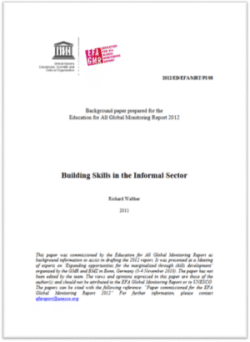
Policy highlights:
- In many Sub-Saharan African countries, the informal sector employs 90% of the economically active population. Investing in skills development in the informal sector is, therefore, central to the continent’s sustainable development.
- The majority of informal sector workers are trained within the sector itself and for many higher education graduates the informal sector constitutes the only way of finding a job. This means that for sustainable skills development, policymakers should move away from programmes in formal institutes of education and towards training in the informal sector.
- Measures to build skills in the informal sector include: 1) implementing programmes targeting educated young people, as they have the most potential to make a decent living and boost the growth of the sector as a whole; 2) providing apprenticeships on a large scale, as on-the-job learning is the most common way for youth to acquire employment; and 3) making sure that policies and programmes are also implemented in rural sectors.










